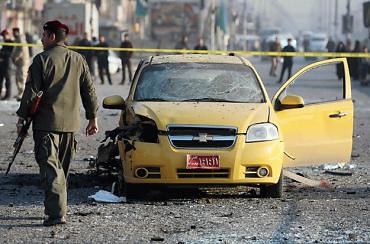
Aftermath of bombings in Baghdad where dozens were killed in renewed attacks. Since the US ostensibly withdrew nearly 450 have been killed., a photo by Pan-African News Wire File Photos on Flickr.
Bombings kill 14 around Iraqi capital Baghdad
By BUSHRA JUHI, Associated Press
BAGHDAD (AP) — Bombings in and around Baghdad killed 14 people and wounded more than 45 on Thursday, authorities said, as a spike of violence made June Iraq's bloodiest month in almost a half a year.
The attacks pushed the monthly death toll up to 200, the highest since January, when insurgents pounded the nation in the weeks following the U.S. military's withdrawal.
Thursday's deadliest strike came around 9:30 a.m. in the Shiite neighborhood of Washash in western Baghdad, where eyewitnesses said a taxi exploded outside a local market. Eight people died and 26 were injured, police and hospital officials said.
Hadil Maytham and her two children were eating breakfast in their nearby house when they heard the explosion.
"It shook the doors and the windows of the house," said Maytham, 28. "Then we heard shootings, probably by police who usually shoot randomly after explosions."
Bombings generally are a hallmark of Sunni insurgents linked to al-Qaida, and Shiites remain one of their main targets. Earlier Thursday, a roadside bomb in a Shiite neighborhood in southern Baghdad exploded as a police patrol was passing by, killing one person and wounding six.
Two more attacks on Shiite enclaves in northwest Baghdad wounded five more people, police said.
Sunnis also are frequently attacked — especially government officials and security forces.
In the Sunni city of Taji, just north of Baghdad, two cars parked about 100 meters (yards) apart from each other exploded outside the office of the local mayor at dawn, police said. The mayor was not in his office at the time, but the blast killed five people and wounded 18, leaving craters in nearby homes.
Taji is home to a military base and is located about 20 kilometers (12 miles) north of Baghdad.
All officials spoke on condition of anonymity because they were not authorized to release the information.
While violence has dramatically dropped from the wide scale tit-for-tat sectarian fighting between 2006 and 2008, deadly bombings and shootings in Iraq still happen almost every day.
The recent uptick in attacks comes as the government is embroiled in a months-long political crisis in Iraq that has Shiites, Sunnis and Kurds calling for Prime Minister Nouri al-Maliki to resign for sidelining his political opponents. The impasse has all but paralyzed the government.
No comments:
Post a Comment